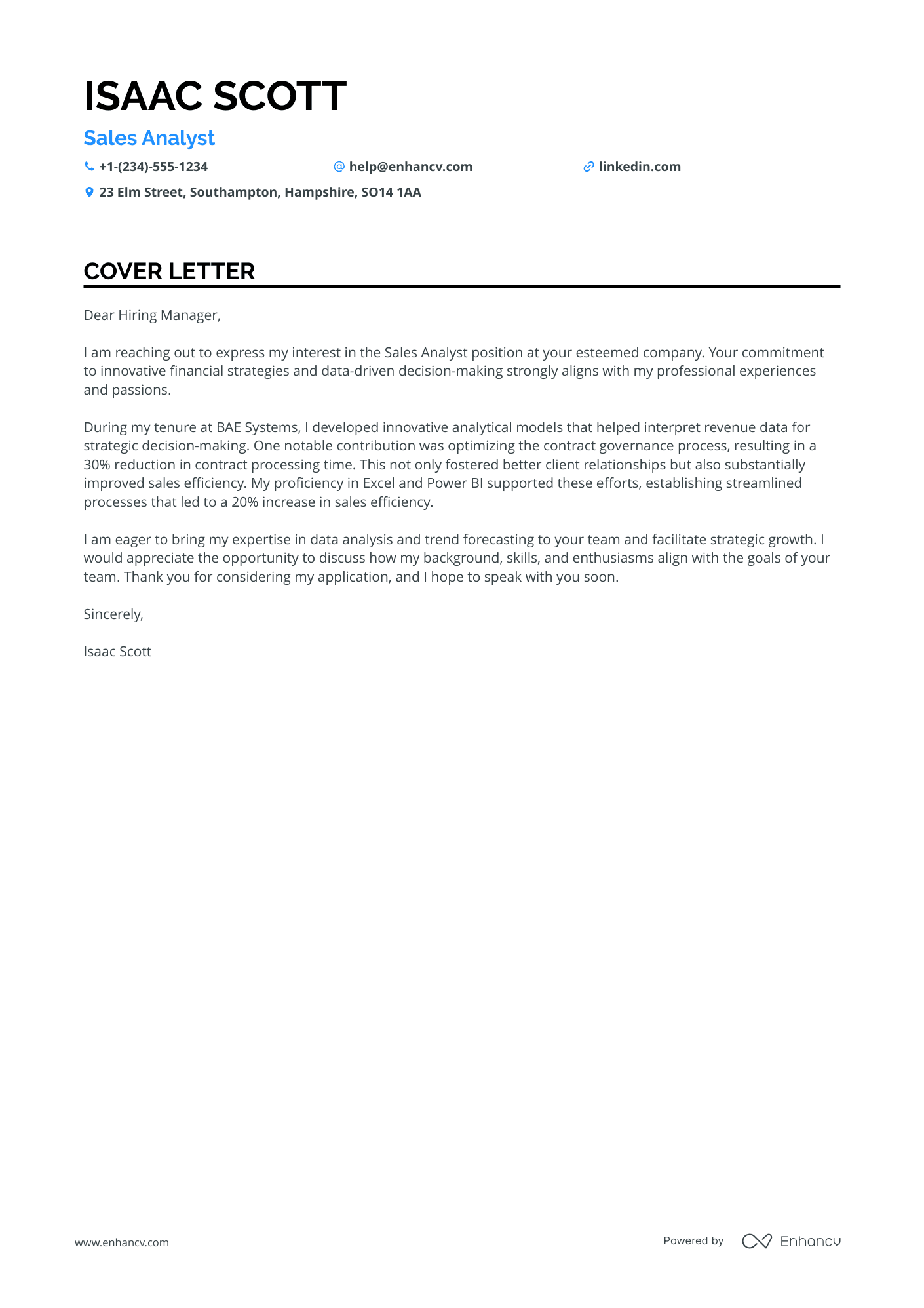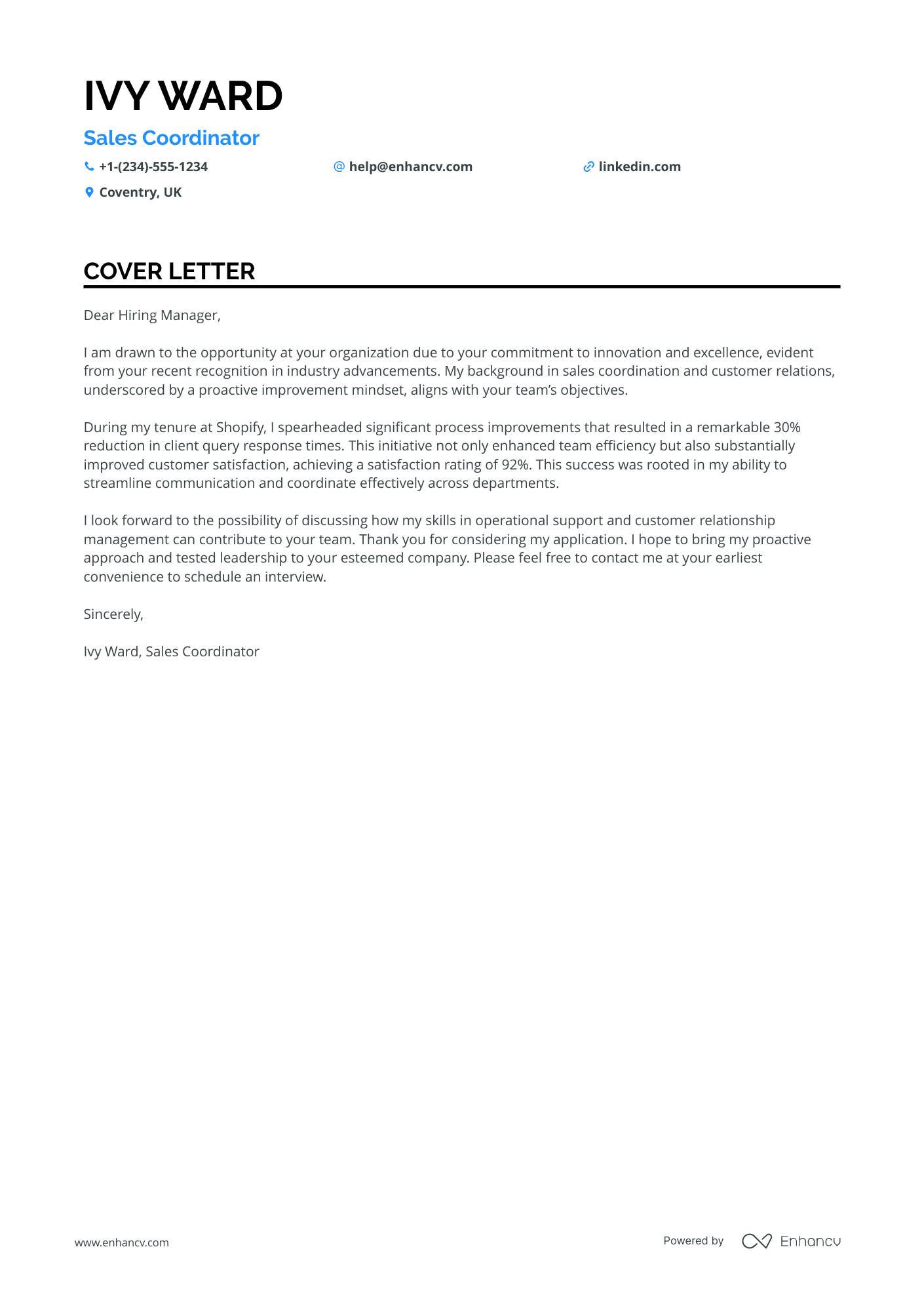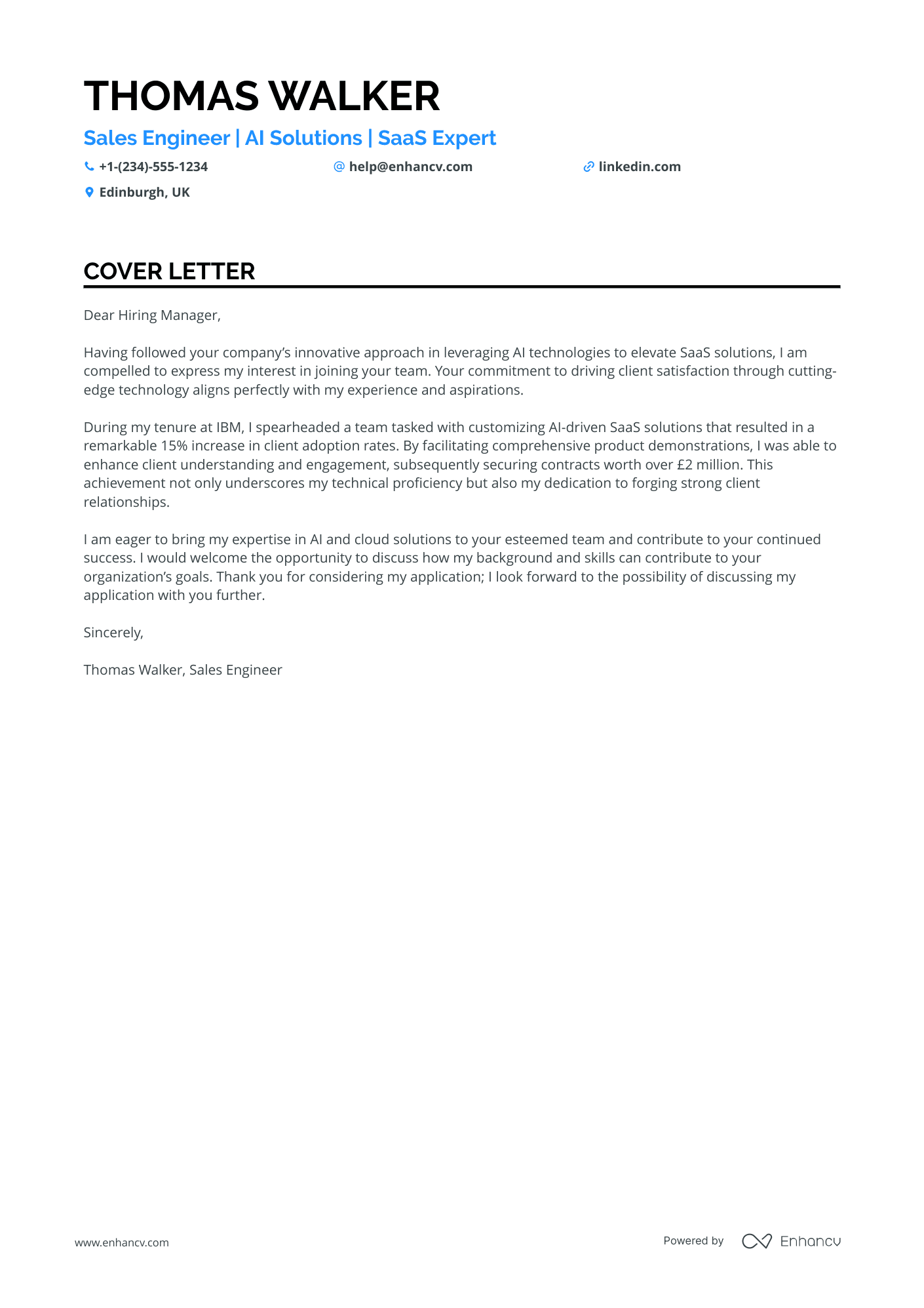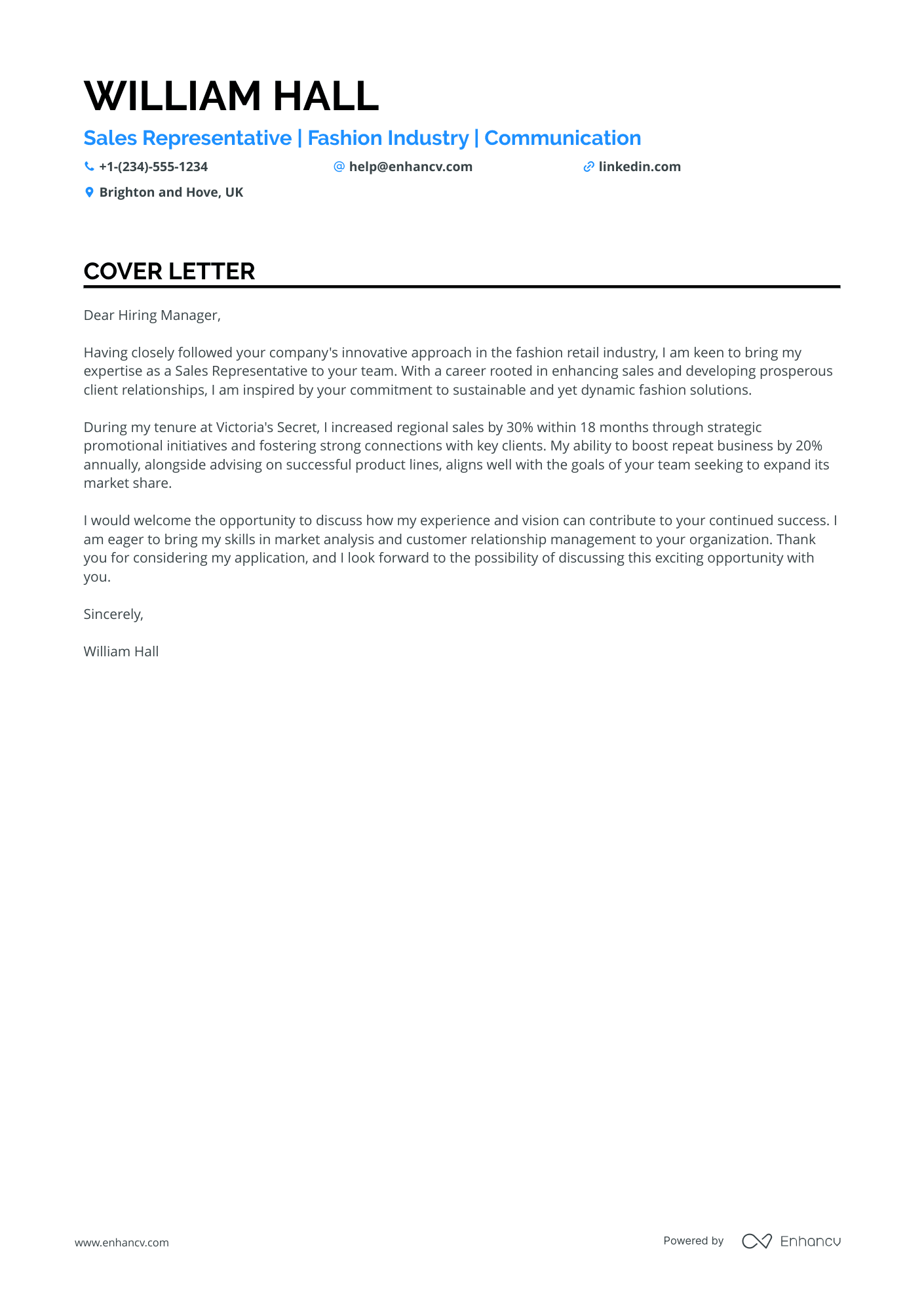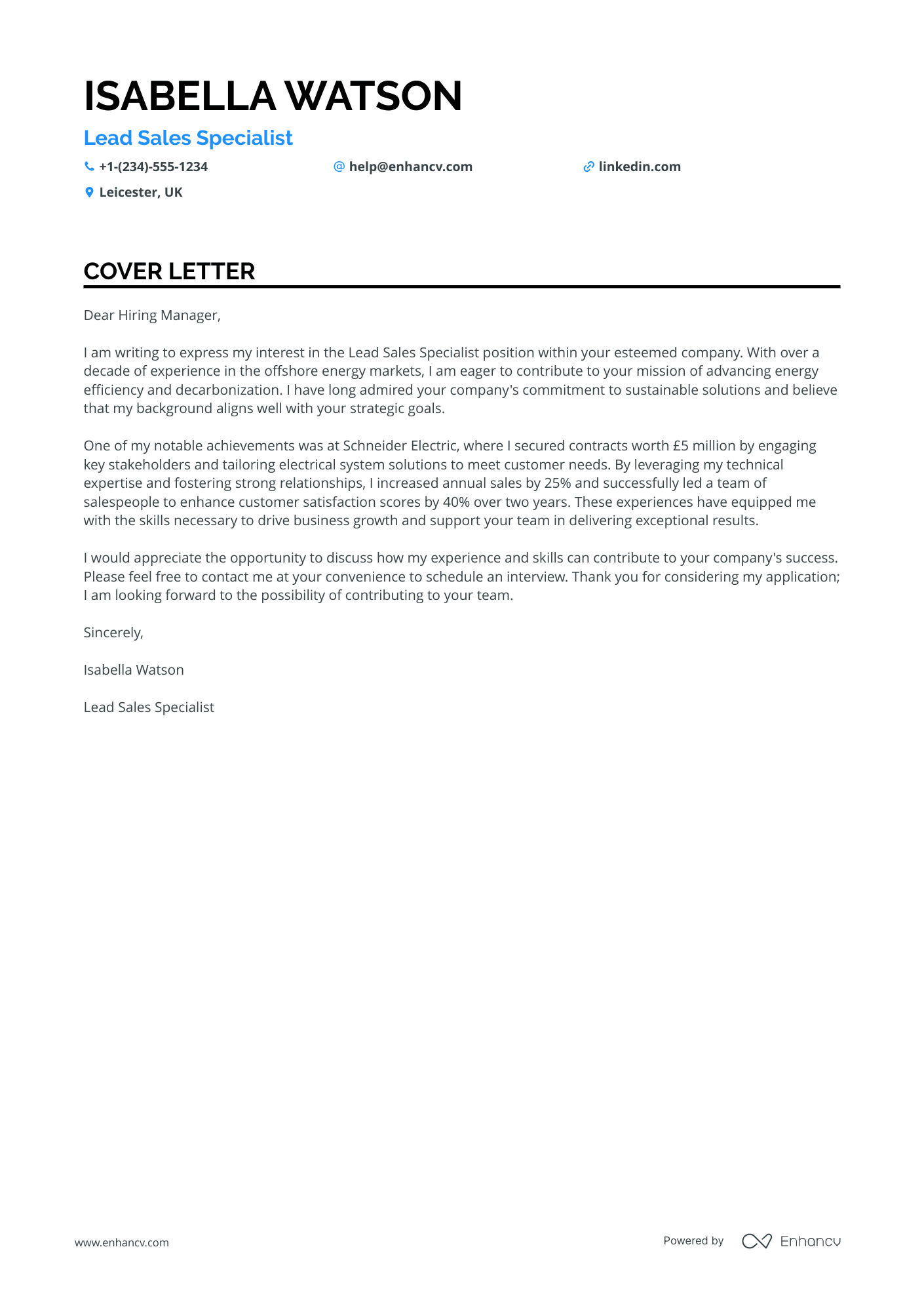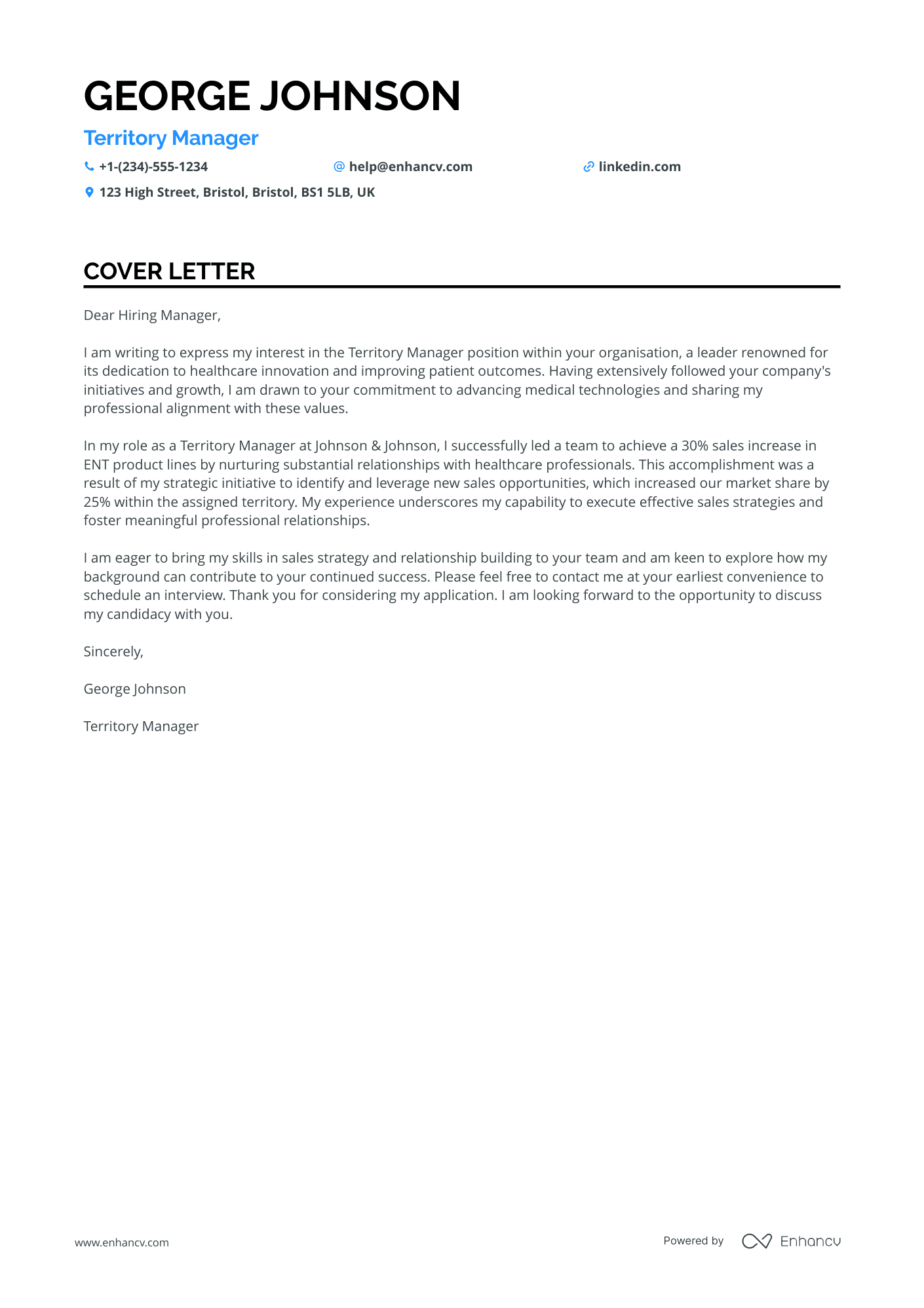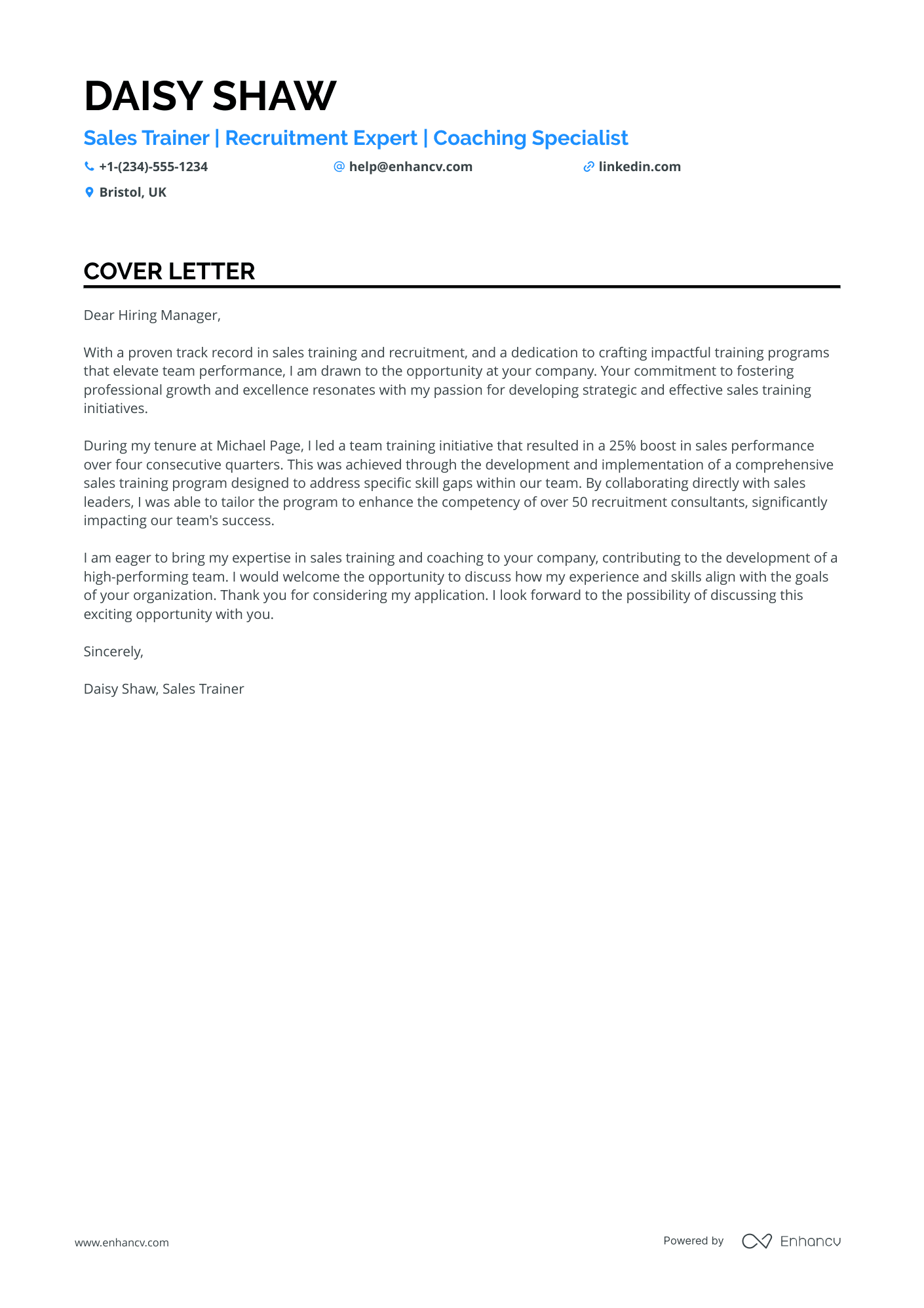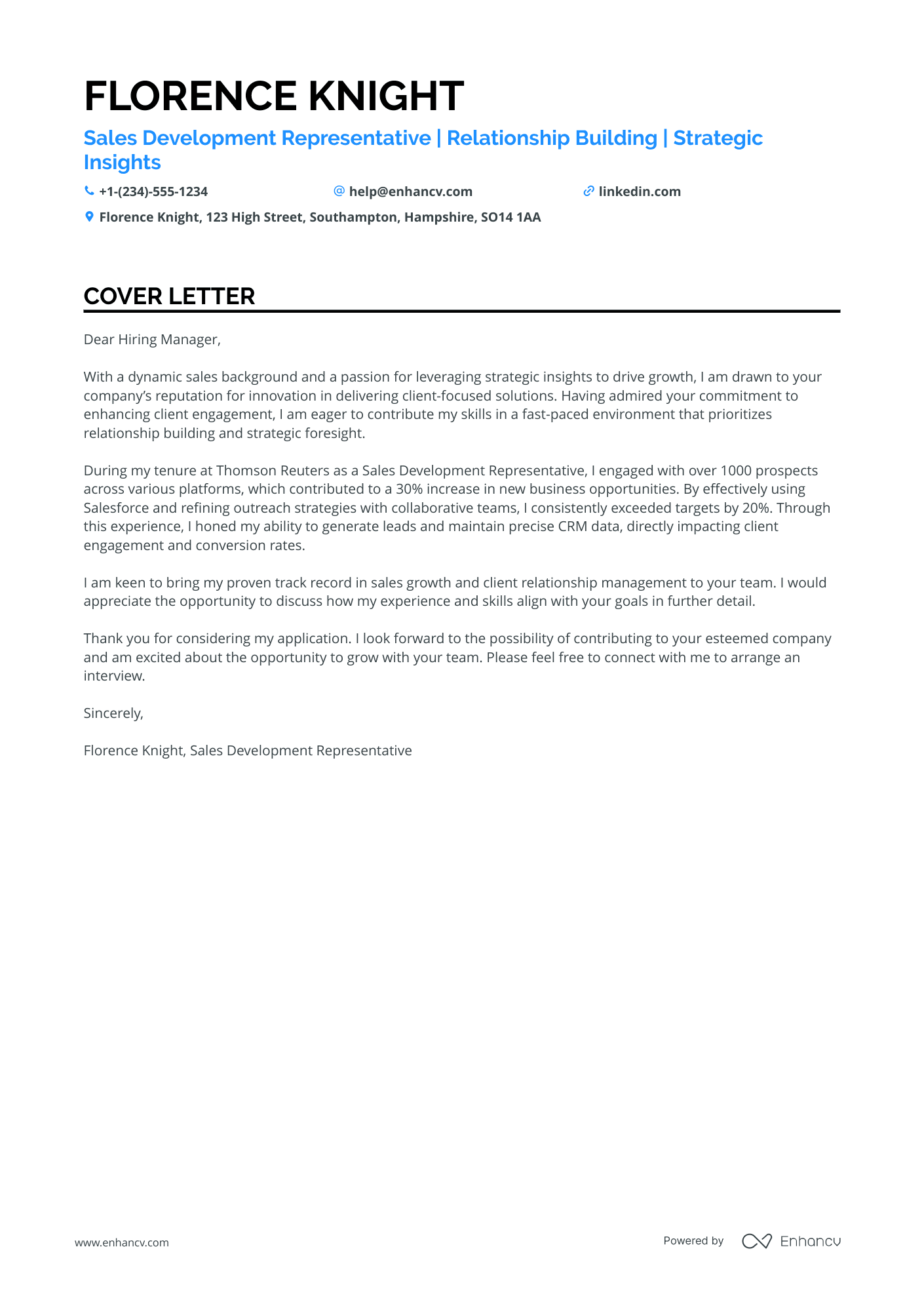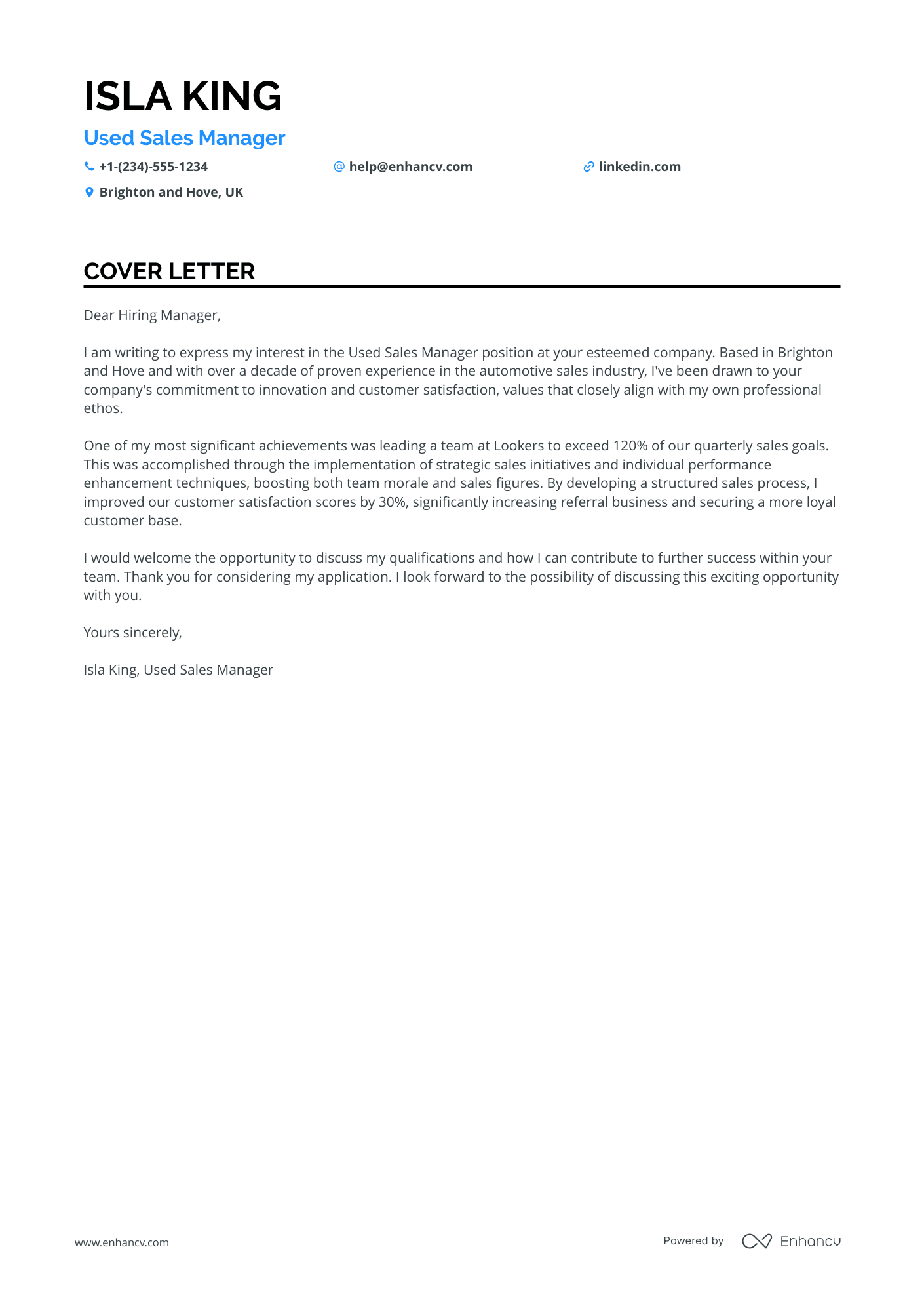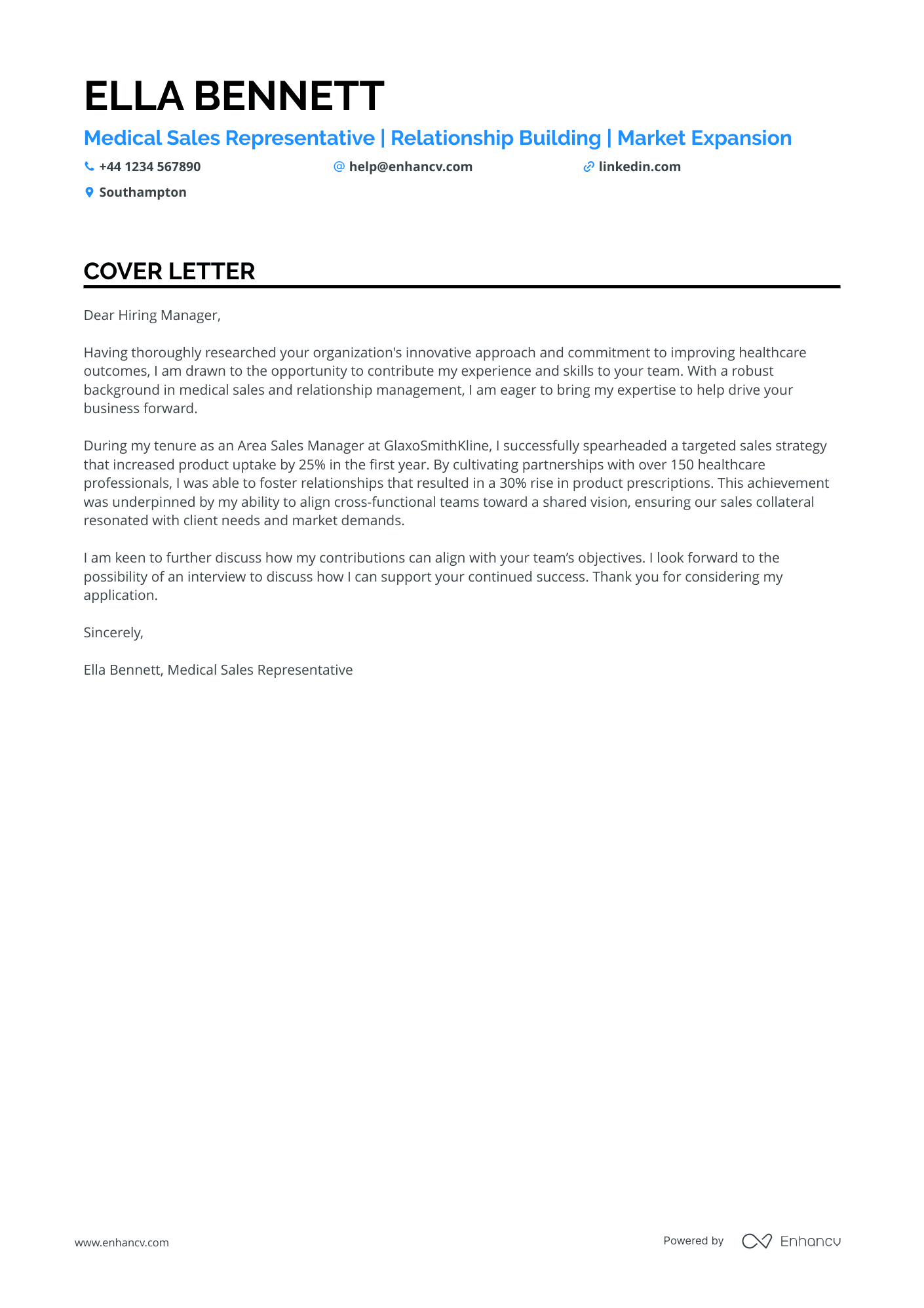Writing a strong cover letter requires close attention to detail, from the tone of voice to avoiding those pesky spelling or grammar mistakes.
Overlooking similar small details can weaken your application.
Many candidates also struggle with how to address the letter, often opting for 'Dear Sir or Madam' when they can’t find the correct contact. This can make your cover letter feel impersonal.
In this guide, we’ll show you how to perfect these crucial elements, ensuring your cover letter is polished and professional without relying on clichés.
Cover letter examples for sales
By Role
Sales Analyst
- Emphasise specific achievements and quantifiable results, such as driving a 20% increase in sales efficiency, to demonstrate impact and effectiveness in previous roles.
- Highlight relevant certifications like the "Certified Salesforce Administrator," which adds credibility to CRM expertise, a crucial aspect of a sales analyst's role.
- Include key skills such as "Data Analysis," "Trend Forecasting," and expertise in tools like "Power BI" and "Excel," to align with job requirements and showcase technical proficiencies.
- Incorporate passions alongside professional accomplishments, showing personal interest in "Aviation Technology" and "Data Science," which could provide additional value and insightfulness in the role.
Sales Coordinator
- Tailored Relevance: Ivy highlights her role as a Sales Coordinator and operational support experience, focusing on areas such as customer satisfaction and process improvements that are critical to the position.
- Quantifiable Achievements: The cover letter effectively uses quantifiable metrics, such as a 30% reduction in response time and a 20% increase in upsell opportunities, to substantiate Ivy's successes and impact on business objectives.
- Specific Skill Set: The inclusion of relevant skills like SaaS Solutions, CRM Tools, and Project Management showcases Ivy's qualifications directly related to the sales coordination role, underlining her capability in handling technical and strategic aspects.
- Alignment with Education and Courses: Ivy's educational background in Business Administration and completion of advanced courses in customer service and SaaS operations demonstrate her commitment to continuous improvement and relevance in the field.
Sales Engineer
- Industry-Specific Skills: Highlighting expertise in AI, cloud technologies, and SaaS solutions, which are critical for a Sales Engineer role in tech-focused enterprises.
- Quantifiable Achievements: Including percentages and financial figures (e.g., increasing client satisfaction by 35% or winning contracts worth £2 million) adds credibility and demonstrates measurable success.
- Cross-Functional Collaboration: Mentioning collaboration with cross-functional teams to integrate solutions showcases the ability to work effectively with various departments, a key attribute for the role.
- Education and Continued Learning: Featuring advanced education, like an MSc in AI, and relevant courses suggests a strong foundation and ongoing commitment to staying knowledgeable in the field.
Sales Representative
- Emphasising the achievement of increasing regional sales by 30% at Victoria's Secret, which demonstrates effective promotional and relationship-building strategies crucial for a sales role in the fashion industry.
- Highlighting a Master of Business Administration (MBA) degree from the University of Sussex, which adds credibility regarding expertise in business management and strategic decision-making.
- Showcasing advanced proficiency in Excel and PowerPoint, which are essential tools for analysing data and presenting sales strategies effectively in a competitive fashion sales environment.
- Mentioning the Certified Professional Sales Person (CPSP) certification demonstrates a dedication to achieving high performance in sales techniques, adding value to the applicant's expertise and commitment to personal development.
Technical Sales Specialist
- Highlighting Industry-Specific Experience: Isabella demonstrates over a decade of specialised sales experience in offshore energy markets, highlighting her understanding and expertise in this niche field.
- Emphasis on Technical Skills: The cover letter effectively showcases her technical knowledge and skills in electrical systems, which is crucial for driving business development in the energy sector.
- Proven Track Record with Metrics: Isabella uses quantifiable achievements, such as increasing annual sales by significant percentages and securing million-pound contracts, to build credibility and demonstrate her effectiveness in sales.
- Leadership and Team Management: The letter details her experience in leading sales teams, which is valuable for a lead sales specialist role, evidencing her capability in managing and guiding sales personnel.
Pharmaceutical Sales Representative
- Highlighting a specific certification related to ENT product lines, such as the "ENT Product Specialist Certification," demonstrates specialised expertise crucial for healthcare sales roles.
- Emphasising skills like "Relationship building" and "Negotiation" underlines the importance of client interactions and partnerships in territory management roles.
- Quantifying achievements such as leading a team to achieve a "30% increase in sales" offers concrete evidence of successful sales strategy implementation and impact.
- Incorporating an "Innovation in Customer Solutions" award highlights the ability to devise customised healthcare solutions, which is vital for maintaining competitiveness and addressing client-specific needs.
Sales Trainer
- Highlighting Relevant Experience: Daisy Shaw effectively showcases her 7+ years of experience in sales training and recruitment, emphasising her capacity to enhance team performance by 25%, which is crucial for a Sales Trainer role.
- Emphasis on Skill Development: The cover letter underscores her strengths in creating engaging training content and mentoring, which are essential skills in building successful training programs and boosting team capabilities.
- Certifications and Achievements: Daisy highlights her "Advanced Sales Techniques Certification" and "Effective Training Delivery" certification, demonstrating her dedication to continuous professional development and ability to deliver impactful training.
- Accomplishments with Metrics: Including quantifiable achievements, such as exceeding recruitment targets by 120% and enhancing client retention by 50%, provides concrete evidence of her success and effectiveness in previous roles.
Sales Development Representative
- Quantitative Achievements: The cover letter effectively highlights specific achievements such as a 40% increase in sales and a 30% boost in customer engagement, making it persuasive by showing quantifiable success.
- Relevance of Skills and Experience: By emphasising expertise in CRM applications, relationship-building, and a proven track record in sales development, the cover letter is well-aligned with the job requirements for a Sales Development Representative.
- Strategic Communication and Insights: The inclusion of strategic communication tactics and strategic planning showcases the applicant's ability to leverage skills for business growth, which is crucial for roles in sales and development.
- Formal Education and Continuous Learning: Highlighting an MBA and relevant courses demonstrates a commitment to professional development and mastery of necessary tools and strategies in sales and communication.
Automotive Sales Manager
- Results-driven Leadership: The cover letter effectively highlights Isla King's track record in exceeding sales targets and facilitating team success through strategic sales initiatives, critical for a Used Sales Manager role.
- Sales Process Improvement: It addresses the development and implementation of structured sales processes that enhance customer satisfaction and loyalty, aligning with the role's emphasis on experience and customer relations.
- Management Skills: The experience section underscores Isla's ability to lead, motivate, and reduce turnover in sales teams, showcasing valuable team management skills applicable to the leadership aspect of the manager position.
- Recognition and Achievements: Highlighting awards like 'Sales Leader of the Year' and the 'Operational Excellence Award' demonstrates a proven track record in leadership and process improvement, illustrating a recognised capacity for delivering exceptional results.
Sales cover letter example
Ella Bennett
Southampton
+44 1234 567890
help@enhancv.com
- Highlighting Relevant Industry Experience: Emphasizing experience within the medical sales industry, as done with the mention of the Area Sales Manager position at GlaxoSmithKline, showcases an understanding of the target market and industry-specific challenges.
- Demonstrating Achievements and Metrics: Mentioning quantifiable successes, such as increasing product uptake by 25% and a 30% rise in prescriptions, provides concrete proof of past performance and effectiveness in similar roles.
- Building Relationships: Pointing out experience in building and maintaining partnerships with healthcare professionals indicates strong interpersonal and relationship management skills, which are crucial for success in a sales role.
- Aligning Personal Qualities with Company Goals: Expressing alignment with the company’s mission and values, such as an interest in their innovative approach and healthcare improvement commitment, helps to establish a cultural fit and genuine interest.
Importance of cover letters in the United Kingdom
Cover letters are a crucial part of your application, offering additional details beyond your CV.
Here’s why they’re essential:
- Supporting your CV: Now's your opportunity to provide some context for your experience, with more information on your key achievements and how your profile could benefit the position and organisation to which you're applying.
- Showcases your character: Taking the time to write a cover letter demonstrates that you’re proactive, organised, ambitious, and genuinely interested in the role.
- Reflects your career goals: Use the cover letter to outline your long-term career career aspirations and how this role aligns with your broader plans.
What UK employers expect from a cover letter
A great cover letter can set you apart when applying for jobs in the UK.
Follow these tips to ensure you make a strong impression:
- Research thoroughly: Spend time delving into the company’s website, social media, and industry news to understand their projects, awards, and future plans. The more specific your knowledge, the better you’ll be able to demonstrate your suitability for the role.
- Reflect their values: Every UK company has its own set of values that guides their culture. Once you’ve identified them, make sure your cover letter reflects how your values and work ethic align with theirs. If they’re known for integrity, emphasise your commitment to ethical practices.
- Tailor your skills: Focus on aligning your most relevant skills with the job description. Look for key terms and priorities mentioned in the advert, and make sure to provide examples of how you excel in those areas.
How to format a sales cover letter
To get your cover letter's formatting right:
- Use a modern font like Lato, Raleway, or Chivo, rather than the overused Arial or Times New Roman.
- Set your cover letter to be single-spaced with 1-inch (2.5 cm) margins on all sides—our templates are automatically set up for you.
- Ensure both your CV and cover letter are consistent in font style and formatting.
- Always send your cover letter as a PDF to prevent alterations and preserve its layout.
When it comes to structuring your cover letter, follow this sequence: begin with your address and contact details, then the employer's details (i.e. name and address), and the date. Next, start with a personalised greeting, followed by your introductory, body, and closing paragraphs. Be sure to include a sign-off and your signature at the end.
Remember, although Applicant Tracking Systems (ATS) software, which may scan your CV for keywords, won't read your cover letter, it will be reviewed by recruiters.
How to write your sales cover letter salutation
In a world of AI and instant prompts, taking the extra time to personalise your cover letter truly makes a difference.
Address the hiring manager directly with a customised greeting (e.g., 'Dear Mr Bond', 'Dear Ms Penny').
You can often find their name on LinkedIn (under the job listing or by searching) or in the ‘About’ or ‘Meet the Team’ section of the company's website. If in doubt, you can also contact the reception for assistance.
If you can't find the name, rather than using 'Dear Sir or Madam', opt for something more personal, such as 'Dear [Company Name] Hiring Manager'.
How to write your sales cover letter intro
While your cover letter should remain professional, adding a touch of personality or humour can make you stand out.
Hiring managers sift through countless applications, day in and day out. Anything unique or personable that grabs their attention could give you a competitive edge.
But do your homework first to ensure a dash of creativity would be appropriate and suitable to the company culture.
How to write your sales cover letter body
As you reach the body of your cover letter, you might wonder what to write in it.
Our advice? Don’t just copy your CV—choose your greatest achievement and tell its story.
Focus on how you got there using hard and soft skills, describe your involvement, and quantify the results with concrete outcomes.
Remember, recruiters aren’t looking for an epic tale of your career—they want something concise, relevant, and directly addressing their needs.
How to write a closing paragraph
Now we’ve reached the closing paragraph of your cover letter. You might be tempted to end with a simple Yours sincerely, but don’t!
Instead, finish with a promise to enhance the company’s performance metrics (backed by your hard and soft skills), to develop as a professional, or something else that holds significance for the organisation. Whatever you choose, ensure to stand behind your words and be remain sincere.
Don’t forget to include a call to action, encouraging recruiters to suggest the best time to follow up for an interview or update.
Conclusion
A well-crafted cover letter can significantly enhance your job application and set you apart from other candidates. Begin by personalising your message to the hiring manager and connecting your experiences to the company's values.
Emphasise your key accomplishments that reflect your skills and passion for the role, while maintaining a professional tone throughout. Ensure that your cover letter and CV present a unified and polished image to maximise your chances of success.
